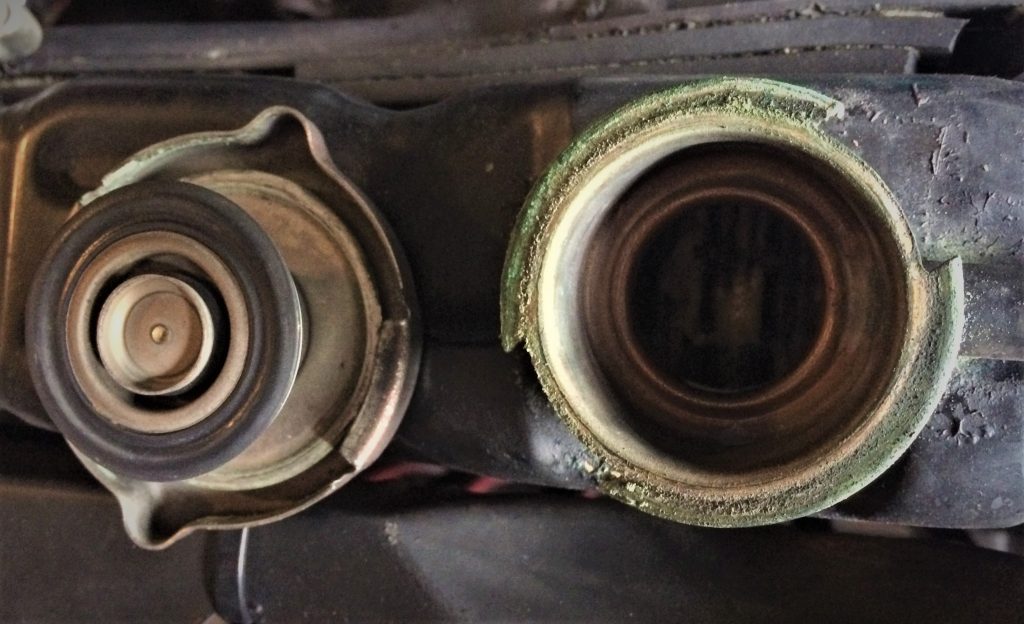Q: Why do I need to use antifreeze?
…
A: The fluid you use in your engine’s cooling system can affect its performance. For most vehicles, a 50/50 mixture of antifreeze and water is recommended.

Why?
In a perfect world, we would use pure distilled water. Water is an excellent cooling agent. It efficiently carries heat away from the engine. It also transfers heat to the air effectively through the radiator.
However, water has a downside:
- It will cause rust and corrosion inside the cooling system.
- It is a poor lubricant.
- Gaskets, seals, and the water pump will break down without lubrication.
- It has a relatively high freezing point (32° F) and low boiling point (212° F).
- If the coolant freezes or boils, it will damage the engine.
- It needs to stay in a liquid form.
To solve these problems, we use antifreeze.
Antifreeze is a glycol-based fluid. It has ingredients that inhibit corrosion and lubricate parts. It also lowers the freezing point. (Hence, the name.)
NOTE: Antifreeze also raises the boiling point, but only slightly. Protection from boiling over is provided by the radiator cap.
The downside to antifreeze is that it does not transfer heat as well as water. Mixing the fluids provides some benefits of both.
How Much Should I Use?
For stock and mildly modified engines, check your owner’s manual. We recommend you follow the OEM specifications for the type and amount of water and antifreeze.
In certain conditions, you can adjust the coolant mixture to your needs.
In very cold places, you may need some additional freeze protection.
If you live in a warmer climate, the freezing point becomes less important. The chart below gives some guidelines for coolant mixture.
| % of Water | % of Antifreeze | Freezing Point | Boiling Point |
|---|---|---|---|
| 30% | 70% | -67° F | 235° F |
| 40% | 60% | -63° F | 232° F |
| 50% | 50% | -35° F | 223° F |
| 60% | 40% | -10° F | 220° F |
| 30% | 30% | 7° F | 220° F |
| 80% | 20% | 18° F | 216° F |
| 90% | 10% | 26° F | 214° F |
| 100% | 0% | 32° F | 212° F |
Tech Notes
- The temperatures above do not take system pressure into account.
- To raise the coolant boiling point, you may need a high-pressure radiator cap.
- With less or no antifreeze in your system, a coolant additive can help prevent corrosion, lubricate parts, and improve the cooling capability.
- For special uses, non-glycol, water-based, and waterless coolants are available.
- Details for using these products vary.
- Check the instructions for specific recommendations.
…
This is another in a series of weekly Q&A Mailbag sessions with Summit Racing‘s tech department, in which there are hundreds more. Click here to see them all.

[…] Q: Why do I need to use antifreeze? … A: The fluid you use in your engine’s cooling system can affect its performance. For most vehicles, a 50/50 mixture of antifreeze and […] Read full article at http://www.onallcylinders.com […]
Another well written article that helps simplify the key operating parameters of a complex series of components working in harmony to maintain a specific operating temperature for thermal efficiency.
But that 50/50 mix ratio for water (hopefully distilled) and the concentrated anti-freeze seems to be a relatively safe number that was widely accepted in a slice of time known as the fifties. It is still being used in modern times but perhaps it’s time for a change. As stated in the article, plain water is a better all around substance for efficiently transferring heat away from the engine to be dissipated from the radiator and eventually into the surrounding atmosphere.
Soooo…a point worth considering is to use less ethylene glycol and more water in the mix. Thermal transfer is more efficient and in the event of a ruptured coolant hose during a run whatcha brung event at the strip, the massive mess is reduced thanks to water being much easier to get off of the track surface. Plus the poisonous levels of essential chemicals used in conventional antifreeze has less of a environmental impact. But since my rant is running way too long, we should discuss tree hugging at a later date
Very nice